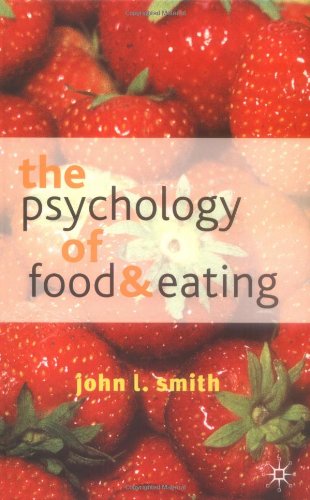

Most ebook files are in PDF format, so you can easily read them using various software such as Foxit Reader or directly on the Google Chrome browser.
Some ebook files are released by publishers in other formats such as .awz, .mobi, .epub, .fb2, etc. You may need to install specific software to read these formats on mobile/PC, such as Calibre.
Please read the tutorial at this link: https://ebookbell.com/faq
We offer FREE conversion to the popular formats you request; however, this may take some time. Therefore, right after payment, please email us, and we will try to provide the service as quickly as possible.
For some exceptional file formats or broken links (if any), please refrain from opening any disputes. Instead, email us first, and we will try to assist within a maximum of 6 hours.
EbookBell Team

4.8
94 reviews
ISBN 10: 0333800206
ISBN 13: 9780333800201
Author: John L. Smith
There has long been an interest in food among psychologists across the full range of the discipline, from the physiology of hunger and the psychophysics of taste and smell to the development of food preferences and the social psychology of food-related behaviour and attitudes. In this new text John L. Smith takes a much-needed broad view of the field, bringing together physiological research, psychodynamic theory and sociological perspectives in a way that both celebrates their differences and explores their potential fusion.The Psychology of Food and Eating provides more than a 'dry' decontextualised physiological explanation of food and eating. It moves on to enable students to see food in its wider context in terms of everyday life and real routines. It provides an overview of social scientific approaches to the study of food (bio-social, socio-anthropological, structural, feminist/psychodynamic) and an appreciation of the various ways that social psychological perspectives can be applied to real-life contexts.With its detailed (and almost confessional) account of the research process, students will gain an insider's perspective on how observational and idiographic techniques are deployed in practice in everyday settings. The book will prove of interest not only to students and researchers on health psychology, applied psychology and critical psychology courses, but also to all those looking for a really accessible introduction to contemporary alternatives to the more conventional research techniques used in this field.
Babies and Mother’s Milk
Children and Food
Attitudinal and Cognitive Basis in Choice of Dish and/or Menu
Famine
Poverty and Malnutrition
Non-biological Perspectives
Hunger, Flavour, Digestion and Kitchen Chemistry
Eating Disorders: The Feminist, Control and Biomedical Discourses
Dinner Party (Agentic Participant Observation Case Study)
Eating Out in a Small Way (Idiographic Observation)
Food Discourse (Magazines and Cook Books)
how does food affect you psychologically
the psychology of food
the psychology of eating and drinking
the psychology of eating research paper
the psychology of eating
Tags: John Smith, Psychology, Food, Eating, Approach